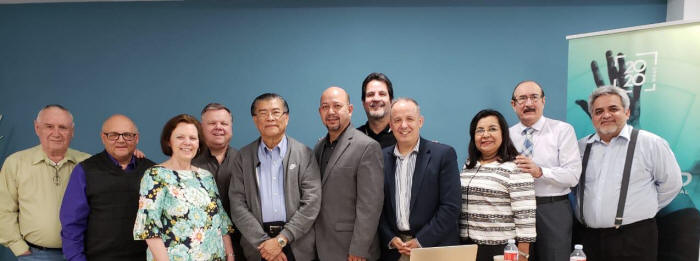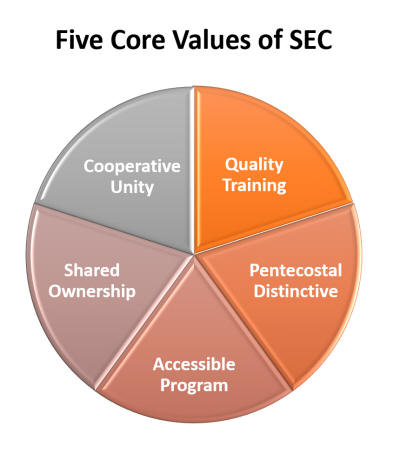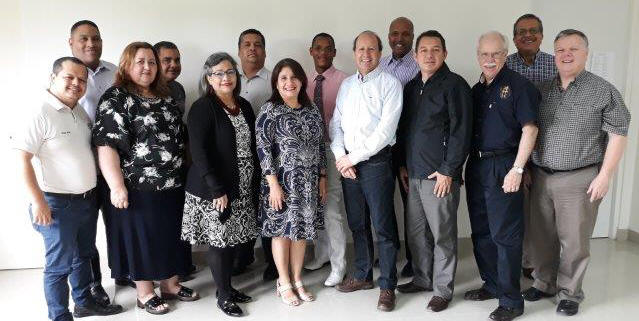|
Plan 2033
Rod and Sherry Boyd
We first heard about Plan 2033 at the
Assemblies of God World Hispanic Fellowship (WHF) last
October. We are privileged to serve as Coordinators for
Christian Training Network (CTN), the international
organization that serves the 19 Spanish-speaking countries
in the Latin America / Caribbean region. Ricardo Castillo,
National Superintendent of the Assemblies of God in Costa
Rica, serves as President of the WHF. He reported that the
Assemblies of God announced a worldwide campaign in
anticipation of the two thousandth birthday of the church in
2033. Pastor Ricardo’s desire to participate and the big
vision of our worldwide fellowship inspired each one of the
international ministry leaders in attendance.

We left the meeting with this challenge: What do we want
our ministry to look like and to accomplish by 2033 and what challenges do
we face? Seven years ago, our team launched a similar campaign – Vision 2020
– looking forward to next year 2020. The evaluation, strategic planning and
work that we have accomplished since 2012 gives us a jump-start on Plan
2033. The Lords has been guiding us since that meeting in October.
More than 40 national directors, superintendents and
members of our ministry team will meet March 12-16 in Panama City, in the
new LARTC facilities. We will present and discuss our Plan 2033 at this
meeting.
What is our Plan 2033? There are 15 points to the plan!
But these can be summarized by the following big brush strokes:
 Fortify
our foundation. Our Vision 2020 campaign launched us on a journey
of understanding who we are and what matters most. This journey of values
helped us fix our foundation. We identified five values that matter most:
Quality Training, Pentecostal Distinctive, Accessibility, Ownership, Unity. Fortify
our foundation. Our Vision 2020 campaign launched us on a journey
of understanding who we are and what matters most. This journey of values
helped us fix our foundation. We identified five values that matter most:
Quality Training, Pentecostal Distinctive, Accessibility, Ownership, Unity.
Knowing what matters is the basis for evaluating current
and future plans. Without these anchor points, it is easy to drift and
wander! If you are interested in ready more about these values, please read
Journey of Values, an article we published to encourage our fellow
missionary educators.
Redefine basic competence. Our program
is stuck in the past! Shortly after CTN was formed in 1960, a three-year
diploma program was established as the basic level of biblical, theological
and ministerial preparation needed to serve in ministry. In 1970, ten years
later, CTN started a fourth-year program. And ten years after that in 1980,
CTN started a master’s program. Today, we have nearly 47,000 students
preparing for ministry! Yet only 275 (0.6%) are in the master’s program and
just 1,000 (2.1%) are in the fourth-year bachelor’s program. More than
45,500 are in the three-year diploma program. While the world around us has
become more educated and basic competence is now a bachelor’s degree, our
program has not sufficiently made advance training available to the masses.
This must change and will only change if we create new delivery systems.

Accredited degrees. Latin America is
becoming more educated. The Spanish word for a bachelor’s degree is
licenciatura. It literally means “licensing” a person in a career or
branch of study. In some Latin American countries, governments are putting
pressure on our national churches to adequately “license” (educationally
prepare) those to whom the church gives credentials (i.e. license to
preach). Accreditation matters. Society, government, parents want studies to
count. We are in the process of forming an agreement with one or more
Christian universities in the United States to provide academic covering to
our program and thereby offer an accredited degree. This is not the whole
answer. But it is a bridge to help individual countries develop a program
that can be accredited in their countries. Part of this process is preparing
more ministers with higher academic degrees.
Certified schools and national programs.
One of our strengths and values is making ministerial training accessible to
all. This has resulted in opening hundreds of branch campuses and
classrooms. Maintainin quality training has been a challenge. Even so, if we
are to achieve accredited studies, it will require certified schools and
programs. We are reforming our certification standards to include the
nationalizing of our Bible school programs. Each country must have a
functioning education office to manage academic records for students and
teachers, teacher appointments, uniform course plan and supervision of
extension studies. Each country must have at least one certified central
school that gives covering to branch campuses and classrooms.
Emphasis on practical training. Even
though our students earn academic degrees, our program is more about
vocational training than academic preparation. Our goal is to train good
ministers – pastors, missionaries, teachers, evangelists, etc. Our Bible
schools maintain this focus. However, as we move up the advanced training
ladder, we must maintain the vocational focus in our master’s level. We are
exploring the possibility of beginning doctoral level studies, an important
step to train teachers for the master’s level! Even so, the emphasis must
remain on practical training for ministry.
Please pray for us as we prepare for the upcoming
Dialogue. Pray that God anoint us as we share what Plan 2033 looks like for
Christian education ministries in Latin America. And pray that God would
guide us as important decisions are made to move us toward fulfilling our
plans for 2033. Our heart and desire is to fulfill the Great Commission to
go and make disciples of all nations. Our calling is to raise up
Christian leaders in Latin America. Not just to make disciples, but to make
disciple-makers who in turn will invest in thousands of harvest
workers around the world.
|